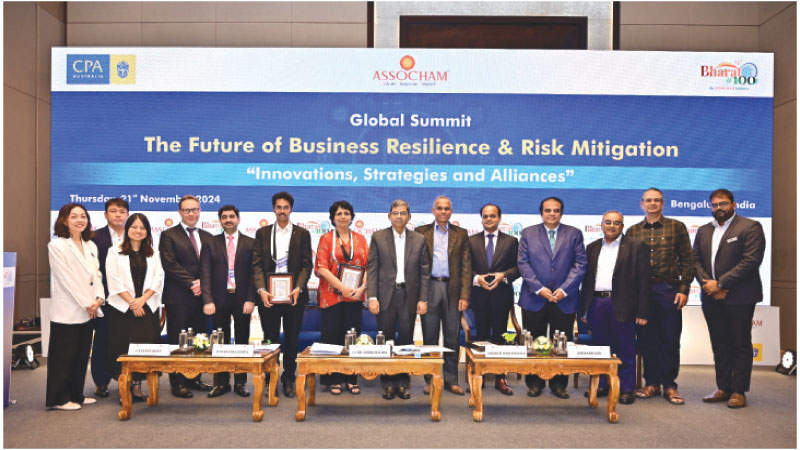The technological innovations which have threatened some of the traditional employment opportunities will not have a negative impact on the accounting profession, said Chairman, ASSOCHAM National Task Force for Accounting Standards, Sustainability Accounting and Integrated Financial Reporting CA, Dr. Ashok Haldia.
He was speaking online to ‘Sunday Observer Business’ on the sidelines of the Global Summit under the theme “The Future of Business Resilience and Risk Mitigation: Innovations, Strategies, and Alliances” in Bengaluru, India organised by Associated Chambers of Commerce and Industry of India (ASSOCHAM), India’s oldest apex industry chamber in partnership with CPA Australia, one of the world’s largest professional accounting bodie,.
Dr Haldia expressed that technology will rather help the accountants in focusing more on decision variables rathe than data crunching.
“India is growing at a rapid pace and this development opens up new opportunities for accountants and accordingly professional opportunities for them is rapidly expanding.”
He said that Indian accountants because of their high competence level are getting lucrative job opportunities worldwide.
He said that technology like AI, data analytics and such other technology tools will help accountants to collect, and analyse data live- online and help in decision making and dissemination of information internally and externally.
Significant transformation
“India’s business ecosystem and policy landscape are undergoing significant transformation, driven by innovation and adaptive governance. With the life span of businesses shrinking business resilience and innovation have become key mantra for growth and survival. The successful integration of AI requires not just technical adoption but also in order to guide organizations in making responsible and forward-looking decisions .”
IAS Principal Secretary, Commerce and Industry Department, Government of Karnataka Dr. S. Selvakumar said, “Karnataka stands as a beacon of innovation, recognised globally for its dynamic ecosystem of research and development, housing the highest number of R&D centres in India.
“As a leading hub for technological advancement, the state is driving electronic design and fostering ease of doing business, making it a preferred destination for transformative industries.
“Big Data and AI are revolutionising decision-making, empowering industries to adopt agile business models that are not merely reactive to crises but proactive in anticipating challenges. This forward-thinking approach underscores the shift from response to preparedness, enabling resilience at its core.”
India’s Karnataka state exemplifies this vision, where government and corporate sectors collaborate to foster an innovation-driven, resilient economy.
“By leveraging the state’s vibrant ecosystem, industries are poised for sustainable growth, blending technological advancement with strategic foresight to build a future-ready business landscape.”
“As technology continues to evolve, businesses face a rapidly changing landscape, which presents both challenges and opportunities. To thrive in this environment, companies need to be more anticipative rather than just responsive. Artificial Intelligence (AI) can play a crucial role in this process.”
“The successful integration of AI requires not just technical adoption but also cultural transformation and conscious leadership can guide organizations in making responsible and forward-thinking decisions while harnessing the power of AI.”
Delivering the keynote address, Business Investment and International Lead for Policy and Advocacy, CPA Australia, Gavan Ord said, “This summit presents a fantastic opportunity for knowledge sharing and inspiring aspirants toward accounting as a profession.”
Challenges
“India is uniquely positioned to lead in technology adoption, as evidenced by its global leadership in financial payments. However, the nation also faces significant challenges, being among those at the highest risk of cyber threats. This creates a critical opportunity for businesses to adopt robust strategies underpinned by advanced cybersecurity technologies. The rapid advancement of technology not only poses risks but also opens pathways for businesses to innovate, adapt, and thrive in an increasingly digital economy.”
Chairman and Managing Director, DPK Engineers and Past Chairman, Karnataka State Development Council, S. Sampathraman said, “Business resilience is not just about weathering challenges but adapting to them and transforming with time.
“It is the ability to turn obstacles into opportunities and emerge stronger, more innovative, and future-ready. Technology plays a pivotal role in this journey, enabling smarter risk mitigation strategies, fostering agility, and empowering businesses to navigate uncertainty with confidence.”
As part of CPA Australia’s vision to drive partnerships and knowledge sharing in the region, the event brought together policymakers, business leaders and financial experts to explore cutting-edge strategies for building risk-resilient, future-ready businesses.

Some of the participants









